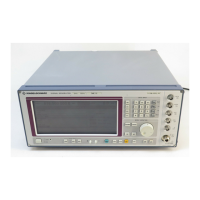SOURce:DM SME
1038.6002.02 3.36 E-13
[:SOURce]:DM:MGRoup?
The command queries the selected type of modulation. „BAS“ is returned for the basic modula-
tions GFSK, GMSK, QPSK, FSK, FSK4, and FFSK. „COMP“ is returned for the complex protocols
ERMES, FLEX, and POCSAG. The command is a query and hence has no *RST value.
Example: :SOUR:DM:MGR? Response: „BAS“
[:SOURce]:DM[:BASic]
The commands that are also valid for modulations GMSK, GFSK, DQPSK, FSK, FSK4 and FFSK
are under this node.
[:SOURce]:DM[:BASic]:TYPE GMSK | GFSK | QPSK | FSK | FSK4 | FFSK
The command selects the type of basic modulation.
GMSK Gaussian Minimum Shift Keying
GFSK Gaussian Frequency Shift Keying
QPSKQuad Phase Shift Keying, a special form of PSK. The key word :DQPSk is also accepted.
FSK Frequency modulation with exactly two states
FSK4 Frequency modulation with exactly four states, designated as 4 FSK in the manual
control.
FFSK Fast Frequency Shift Keying, a special form of FSK
Example: :SOUR:DM:BAS:TYPE FSK *RST value is GMSK
[:SOURce]:DM[:BASic]:STATe ON | OFF
The command switches on or off the modulation selected under :SOURce:DM[:BASic]:TYPe.
Example: :SOUR:DM:BAS:STAT OFF *RST value is OFF
[:SOURce]:DM[:BASic]:SOURce EXTernal | PRBS | DATA
The command selects the data source.
Note: Even if PRBS is selected, the burst output and the level reduction continue to be
controlled by the list selected under :SOURce:DM[:BASic]:DATA.
Example: :SOUR:DM:BAS:SOUR PRBS *RST value is PRBS
[:SOURce]:DM[:BASic]:CLOCk
The commands to set the data source for the time base used are under this node
[:SOURce]:DM[:BASic]:CLOCk:MODE BIT | SYMBol
The command sets the clock operating mode. Bit and symbol clock pulse are only different in the
case of modulations possessing more than two states, i.e. requiring more than one bit to code
each state. Hence the command only has an effect on QPSK and FSK4.
BIT For each bit, a complete clock cycle is executed.
SYMBol A complete clock cycle is executed for n bits each (one symbol) (symbol clock pulse).
*RST value is BIT
Note
:
This command is also used for reading data from the extended memory XMEM which
is done either serially from the data list or in parallel from the data list together with the
burst list. Therefore, if all symbols are stored in the data list in a 2-bit code each (X and
Y), only BIT, not SYMBol must be selected. This implies also that the command
DATA:XMEM:MODE DATA (no ATTenuate and BURSt list available) is inconsistent
with DM:CLOC:MODE SYMBol when XMEM is used.
Example: :SOUR:DM:BAS:CLOC:MODE BIT

